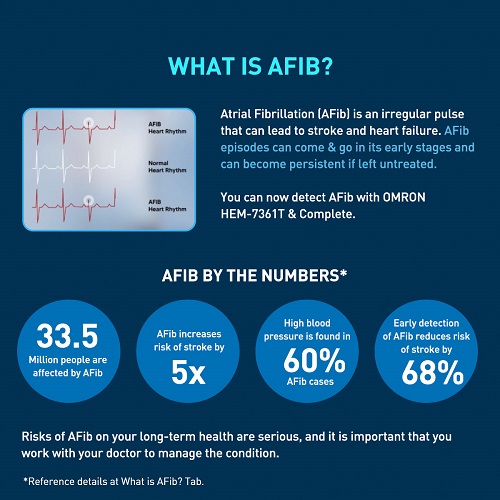Atrial Fibrillation (AFib) is one of the most common heart rhythm disorders that affects people worldwide. It often manifests as an irregular heart rhythm and despite its prevalence, myths and misconceptions surrounding AFib lead to unnecessary concerns and confusion around the disease. AFib is, in fact, easy to understand.

Myth 1: AFib is a benign condition that does not pose any serious health risks and does not require treatment.
Fact: Atrial Fibrillation is associated with serious risks to health such as increased risk of stroke, heart failure and other cardiovascular complications. It is a condition that requires treatments to minimize symptoms and prevent the occurrence of stroke or heart failure. However, AFib is a highly manageable heart disorder with a variety of treatment options available. Such treatments include medications and in some cases cardiac procedures to control heart rate and rhythm, and healthy lifestyle changes.
Myth 2: AFib is always symptomatic; if you have palpitations, you have AFib. No symptoms mean no AFib.
Fact: AFib can be asymptomatic which means some individuals may not experience any noticeable symptoms. This is called Silent AFib. Silent AFib is often associated with an increased risk of cardiovascular complications as the lack of symptoms leads to the delayed treatment and underscoring of the importance of regular check-ups and monitoring. On the other hand, palpitations do not necessarily mean an individual is suffering from AFib. Palpitations is a non-specific symptom that feels like a fluttering or pounding sensation in your chest. Therefore, palpitations will require a diagnosis from a doctor to properly understand as the causation may or may not be due to AFib.
Myth 3: Exercise is harmful for people who suffer from AFib
Fact: Regular and moderate exercise can, in fact, be beneficial for individuals with AFib. It can help to manage weight, reduce stress and aid in the improvement of overall cardiovascular health. However, to practice exercise safely, it is essential to consult a healthcare professional to help determine what type and intensity of exercises are safe and appropriate for you.

Myth 4: AFib only occurs once or twice, I don’t need to worry about it coming back! No checking is needed.
Fact: Atrial Fibrillation is almost always a recurring condition that requires a lifetime of management and treatment to minimize symptoms and prevent stroke and heart failure. One way of managing AFib is by using home blood pressure monitoring. Detecting AFib early may allow it to be treated in a timely manner and managed effectively by your healthcare providers.
By understanding the facts and addressing the misconceptions of AFib, individuals suffering from AFib and their loved ones can make better, well informed decisions regarding heart health management. Making the effort to check yourself regularly through home monitoring and medical checkups aids your healthcare providers in providing the best management for AFib.

OMRON home blood pressure monitoring devices can do just that. HEM-7361T and Complete can detect possible AFib occurrences. HEM-7361T detects AFib by measuring the user’s blood pressure thrice consecutively and will indicate possible AFib if 2 or more irregular heartbeats are detected. For Complete, it reads the user’s blood pressure and electrocardiogram (ECG) at the same time. With the technology of 1-Lead ECG, Complete will showcase the user’s heart rhythm in the waveform format, and indicate “Possible AFib” if present.

|
Previous article Cách ngăn ngừa đột quỵ trước khi “hiểm họa” ập đến - Vietnam |
Next article Your Mental Health May Start from the Heart |